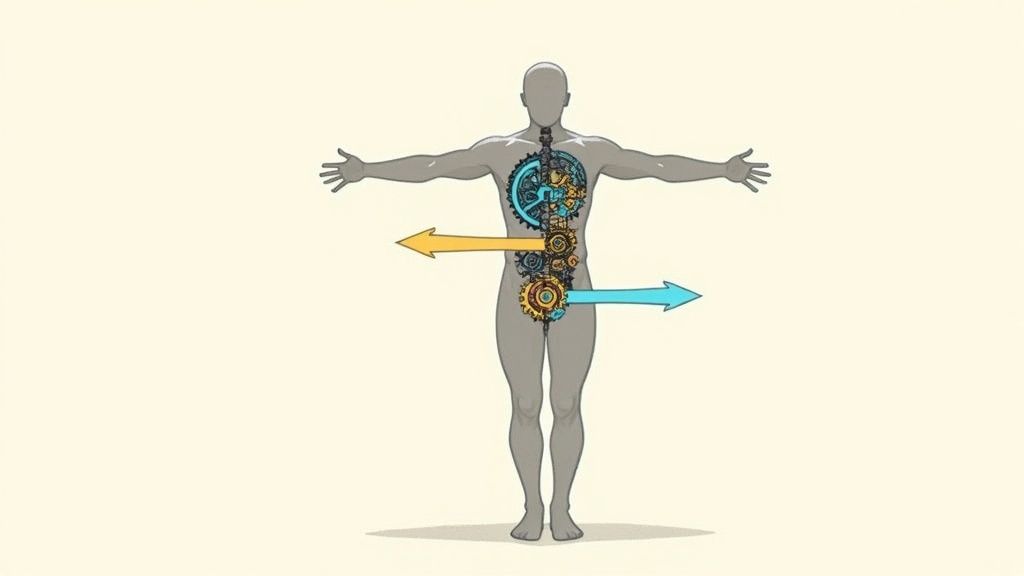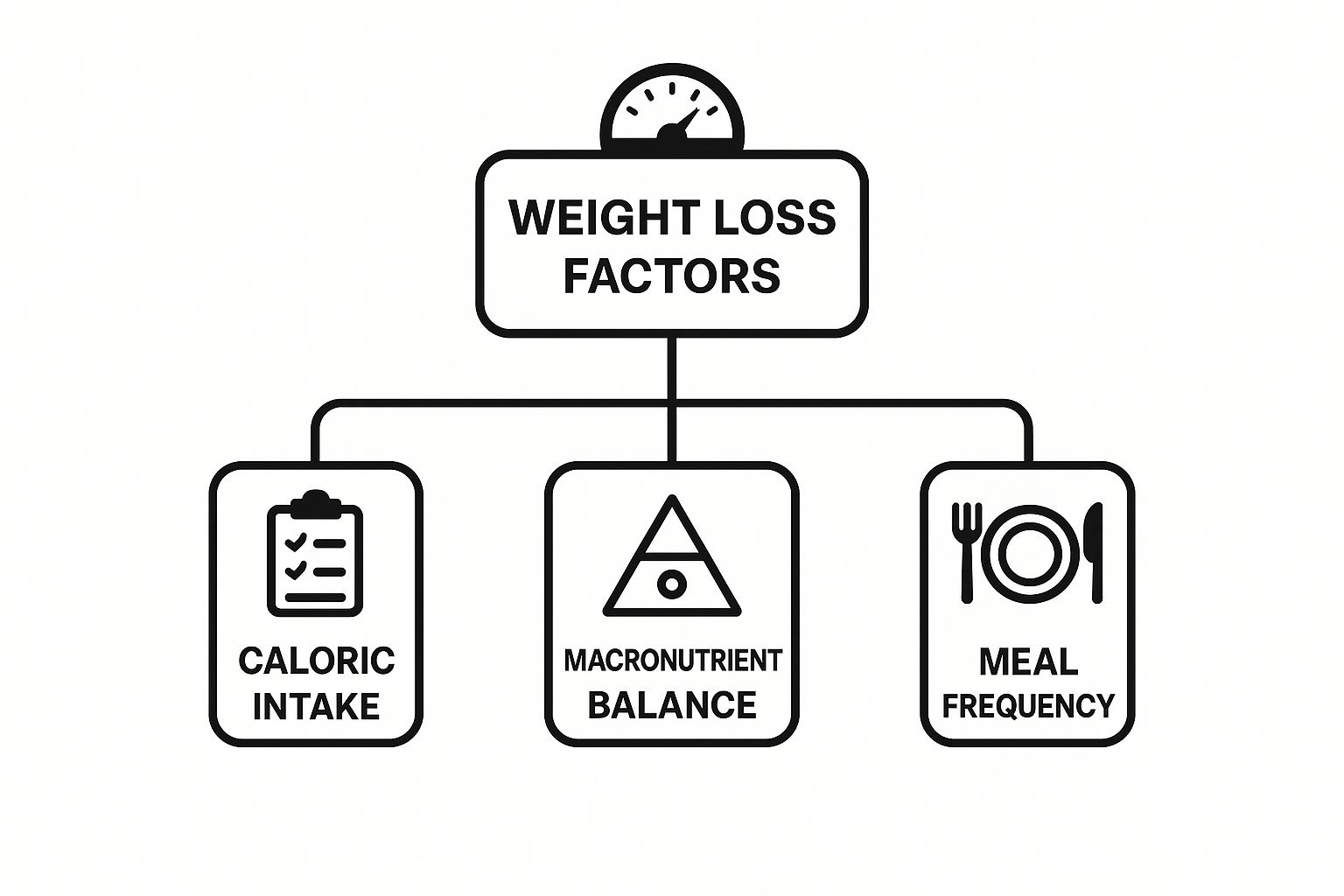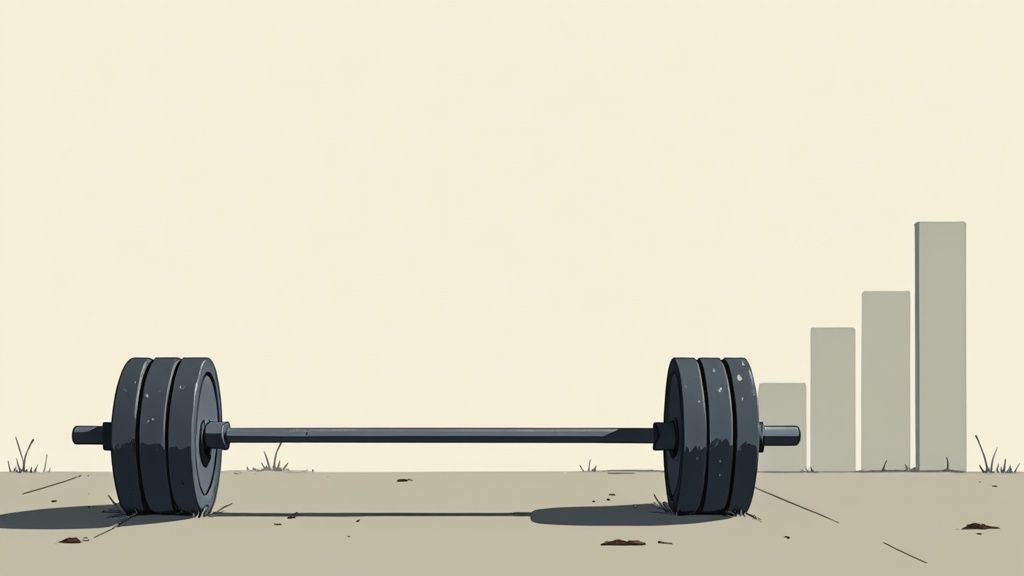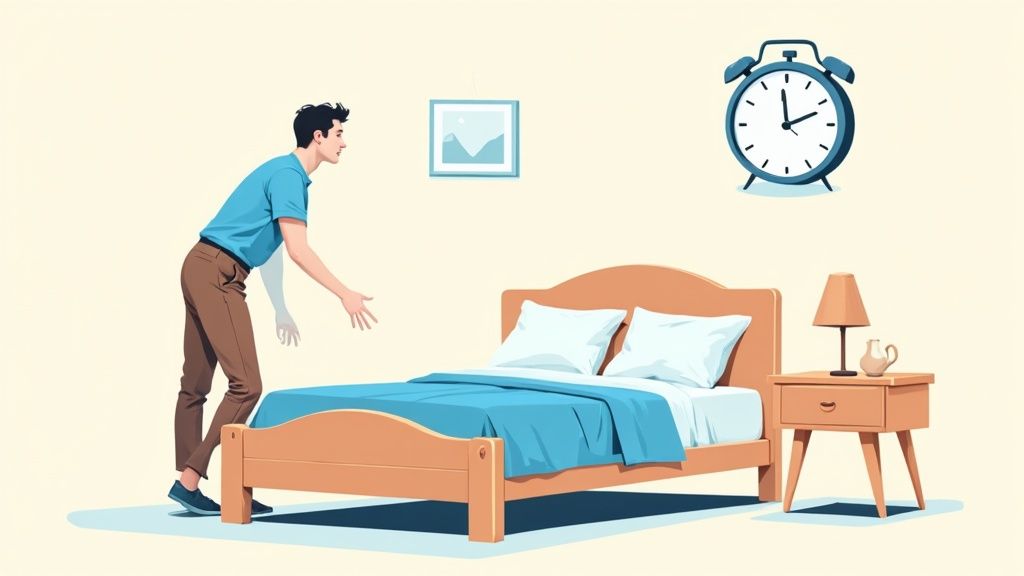What Causes Weight Loss Plateaus? Tips to Overcome Them

It's one of the most frustrating moments in any weight loss journey: you’ve been doing everything right, but suddenly, the scale just... stops. You’re still eating well and exercising, but your progress has completely stalled. This is a weight loss plateau, and it's a completely normal (though annoying) part of the process.
Think of it this way: your body is an incredibly smart and efficient machine. As you lose weight, it adapts to your new, lighter self and your new routines. It learns to run on less fuel. A plateau is simply the point where the calories you're eating now match the calories your body is burning.
Why Your Weight Loss Progress Stalled

Hitting that wall doesn't mean you've failed. It's actually a sign that your body has successfully adjusted to the changes you've made.
Your body is hardwired for survival. When it notices a consistent calorie deficit over weeks or months, it starts making clever adjustments to conserve energy. This isn't just one thing happening; it's a mix of physiological shifts and subtle changes in our own habits that, together, create the perfect conditions for a plateau.
The Main Culprits
So, what’s really going on under the hood? It’s rarely a single issue, but more of a conspiracy of factors working together behind the scenes.
Here are the usual suspects:
- Metabolic Adaptation: This is the big one. As you get smaller, your body simply needs fewer calories to operate. Your metabolism naturally slows down to match your new size.
- Hormonal Shifts: Weight loss can throw your hunger hormones out of whack. Hormones like ghrelin (which makes you hungry) and leptin (which makes you feel full) can fluctuate, leading to more intense cravings. Unstable blood sugar makes this even tougher to manage, which is why it's so important to stabilize blood sugar levels.
- Loss of Muscle Mass: If your routine doesn't include strength training, you might be losing muscle along with fat. Since muscle burns more calories than fat, losing it will slow your metabolism even further.
- Subtle Habit Changes: It's easy to let small things slide without even noticing. Maybe your portions have gotten a tiny bit bigger, or your workouts aren't quite as intense as they used to be. These "calorie creeps" can be enough to quietly erase your deficit.
A weight loss plateau isn’t a dead end. Instead, it’s a signal from your body that it has successfully adapted to your current routine and is now ready for a new challenge.
Once you understand what’s causing the stall, you can stop feeling stuck. It’s all about figuring out which of these factors are at play and then making smart, strategic tweaks to get the needle moving again.
To give you a clearer picture, here's a quick breakdown of the most common reasons people hit a weight loss plateau.
Common Reasons for a Weight Loss Plateau at a Glance
| Cause Category | Specific Factor | Brief Explanation |
|---|---|---|
| Physiological | Metabolic Adaptation | Your body burns fewer calories as you lose weight. |
| Behavioral | Habit Creep | Small, untracked calories or less intense workouts add up. |
| Hormonal | Appetite Regulation | Changes in hunger hormones can increase cravings and appetite. |
Seeing it laid out like this helps to show that a plateau is a multi-faceted problem. The good news is that it also means there are multiple solutions you can try to break through it.
Your Body's Built-In Survival Switch
Think of your body like a house with a smart thermostat. When you leave, it automatically lowers the heat to save energy. Your body has a similar, incredibly intelligent system, but instead of conserving electricity, it conserves calories. This brilliant survival mechanism is the real reason most weight loss efforts eventually hit a wall.
When you consistently eat less, your body doesn't register it as a "diet." It sees a potential famine on the horizon. To protect you, it cleverly dials down its overall energy use. This process is known as metabolic adaptation, and it's a completely normal, natural response to losing weight.
Why a Lighter Body Burns Fewer Calories
First off, a smaller body simply needs less fuel to run. It's just physics. A compact car uses way less gas than a giant truck, and your new, lighter body needs fewer calories for everything—from breathing and pumping blood to just walking across the room.
What this means is that the calorie deficit that was so effective at the start of your journey eventually just becomes your new maintenance level. Your body has simply adapted to its new, more efficient state.
This isn't a sign of failure; it's proof of your body's incredible efficiency. Your system is designed to adapt and survive. A weight loss plateau is often just a signal that it's doing its job perfectly.
Once you grasp this, you can stop fighting against your body and start working with its intelligent design. But that’s only half the story. There's another piece to this puzzle that makes plateaus feel so incredibly frustrating.
The Double Challenge of Hunger and Metabolism
Metabolic adaptation isn't just about burning fewer calories. At the same time, your body ramps up your hunger signals as a powerful counter-attack. This creates a really tough situation where you feel hungrier than ever while burning less energy.
This one-two punch is a primary driver of stubborn weight loss plateaus. In fact, research shows that for every kilogram (about 2.2 pounds) of weight you lose, your daily calorie burn can drop by 20 to 30 kcal. Meanwhile, your appetite-stimulating hormones can crank up your hunger by about 100 kcal per day compared to before you started your diet. You can read more about this in the full research on metabolic changes.
This biological tug-of-war makes sticking to a calorie deficit feel nearly impossible over the long haul.
The diagram below really breaks down the key factors that are in play as you lose weight.

As the image shows, your calorie intake, macronutrient balance, and even how often you eat are all connected levers you can pull to get things moving again.
Your body's internal survival switch is designed to keep you at a stable weight. This is precisely why "just trying harder" or eating even less often backfires. Breaking through a plateau requires a smarter strategy—one that respects these powerful metabolic and hormonal changes. When you understand what’s happening under the hood, you can make targeted adjustments to outsmart the stall and get back on track, without feeling like you're in a constant battle with your own body.
How Common Are Weight Loss Plateaus?

If you've hit a weight loss plateau, it’s easy to feel like you're the only one whose progress has mysteriously ground to a halt. But the truth is, you're in very good company. Stalling isn't some rare event or a sign that you've failed—it's a predictable and incredibly common part of almost every successful weight loss journey.
We’ve all seen the charts showing a smooth, steady, downward line. That’s a myth. Real progress almost never looks like that. It’s more like a series of steps down, followed by flat landings where your body just needs a moment to catch up and adapt. Those landings are the plateaus.
Once you get that, you can shift your whole mindset. Instead of thinking, "I'm stuck and I must be doing something wrong," you can see it for what it is: "My body is adapting. This is a normal part of the process." That perspective is everything when it comes to having the patience for long-term success.
Plateaus Are the Rule, Not the Exception
Far from being some strange problem, hitting a plateau is practically a universal experience. It’s a sign that you've successfully lost enough weight for your body to sit up, take notice, and start its recalibration process. Think of it as a checkpoint, not a roadblock.
This isn't just a feeling; the research backs it up. In a large study with over 6,500 participants, scientists found that nearly all of them hit one or more weight plateaus, which often lasted around three months. The study confirmed these stalls are a totally normal part of the journey and don't stop people from reaching their goals in the end. You can discover more about these weight loss findings.
What this really means is that periods of simply maintaining your weight are naturally mixed in with the periods of active weight loss.
"A weight loss plateau is not a sign that your journey is over. It's an indication that your body has successfully reached a new equilibrium and is ready for the next phase."
So, what does this actually look like for most people?
- The Initial Woosh: The first few weeks often bring quick results, mostly from shedding water weight and making big initial changes.
- The Steady Burn: After that, weight loss continues at a more moderate, sustainable pace.
- The Inevitable Plateau: Eventually, progress stalls. Your metabolism is just adapting to your new, lighter body and your consistent routine.
- The Breakthrough: With a few smart adjustments, weight loss starts up again.
This whole cycle can repeat itself a few times, depending on how far you have to go. Knowing this pattern helps you see plateaus coming and understand them for what they really are: a sign that you’re on the right track, not that you’re lost. It's just your body doing exactly what it's built to do—adapt and find its balance.
The Hidden Culprits Behind Your Plateau
Your body is an amazing adaptation machine, but sometimes, the reason you’ve hit a wall isn't just physiological. The "what causes weight loss plateaus" question often leads back to something far more relatable: the mind.
Losing weight is a long game. Sticking to a strict plan week after week, month after month, is draining. This can lead to a very real problem called diet fatigue.
This isn't about weak willpower. It's about mental and emotional burnout. The endless cycle of tracking, measuring, planning, and resisting temptation simply wears you down. Once that fatigue kicks in, it’s only natural for our focus to slip, often in ways we don't even notice.
The Slow Creep of Hidden Extras
Diet fatigue is a sneaky thing. It rarely announces itself with a weekend-long binge. Instead, it shows up as tiny, almost invisible adjustments to your daily habits.
This "calorie creep" is the slow accumulation of seemingly harmless choices that can quietly erase the calorie deficit you’ve worked so hard to maintain.
Sound familiar? It often looks like this:
- The extra splash: Just a little more olive oil in the pan.
- The untracked handful: Grabbing a few nuts or pretzels while you cook.
- The bigger scoop: A slightly more generous serving of pasta than you started with.
- The less intense workout: Shaving five minutes off your run or not pushing as hard on the last set.
On their own, none of these feel like a big deal. But add them up day after day, and you could easily be consuming an extra 100-200 calories. For many people, that's enough to bring weight loss to a dead stop.
This isn’t a personal failing. It’s a completely normal human response to a long, difficult process. The trick is to build self-awareness and learn to spot these subtle habits before they completely stall your progress.
When Motivation Wanes and Hunger Rises
The behavioral side of a plateau is often tangled up with your physiology. As your body fights back against weight loss, it ramps up hunger signals. When your motivation is already low from diet fatigue, those hunger cues become incredibly hard to ignore.
Research confirms that long-term plateaus are rarely just about one thing. They’re a messy combination of behavior and biology. The stall is often triggered by diet fatigue—where our motivation dips and we get a little less strict—and fueled by hormonal changes that make us feel hungrier. It's a perfect storm working against you. You can read more about these combined biological and behavioral factors in recent studies.
On top of all this, there are other lifestyle factors we often forget, like sleep. Poor sleep can throw your appetite-regulating hormones out of whack, leaving you feeling ravenous and craving the very foods you're trying to limit. Digging into the role of sleep in weight loss is a critical piece of solving this puzzle.
Recognizing these hidden culprits is the first real step toward breaking through and getting back on track.
Practical Strategies to Reignite Your Progress
Knowing why plateaus happen is one thing, but knowing what to do about it is how you get the scale moving again. When your progress grinds to a halt, it's not a sign to give up—it's a signal to adjust your game plan. Think of it as a much-needed tune-up for your routine, designed to outsmart your body's clever new strategies.

The goal here is to introduce something new that your body isn’t expecting. This doesn’t mean you have to overhaul your entire life. In fact, it's often the small, smart tweaks that make the biggest difference and get you back on track.
H3: Recalculate Your Calorie Needs
Let's be real: the calorie goal that helped you lose the first 10, 15, or 20 pounds probably isn't the right one for you anymore. As you get leaner, your body needs less energy just to exist. Your Resting Metabolic Rate (RMR)—the calories you burn doing nothing—naturally drops.
What was once a calorie deficit has likely become your new maintenance level. It's time to run the numbers again based on your current weight. A quick check with an online calculator or a chat with a pro can give you a new daily target. This simple adjustment alone is often enough to kickstart your progress.
H3: Prioritize Protein and Fiber
When the scale won't budge, what you eat becomes even more important than how much. If you want to get things moving again, making protein and fiber the stars of your plate is one of the most effective things you can do.
- The Power of Protein: Protein is your metabolism's best friend. It helps you hold onto precious muscle, which burns more calories than fat. Plus, your body uses more energy to digest protein. Aiming for 25-30 grams of protein at each meal is a game-changer for feeling full and keeping cravings at bay.
- Fill Up with Fiber: Foods packed with fiber—think veggies, beans, and whole grains—add a lot of bulk to your meals without a ton of calories. This is a simple trick to feel completely satisfied while eating less, making it way easier to stick to your new goals.
Hitting a plateau is the perfect opportunity to audit your meals. When you shift your focus from just counting calories to packing in nutrients like protein and fiber, you'll find you have better appetite control and a happier metabolism. That's the key to breaking through.
H3: Embrace Strength Training
If your workout routine has been all about cardio, a plateau is a loud-and-clear sign that it's time to pick up some weights. While cardio is fantastic for burning calories in the moment, strength training builds muscle. And more muscle means you burn more calories around the clock—even when you’re just sitting on the couch.
Adding two or three strength sessions per week can directly fight the metabolic slowdown that often comes with weight loss. Building or simply maintaining your muscle is your number one defense against your body's instinct to conserve energy.
Of course, what you do in the kitchen is just as important. Learning how healthy fats like olive oil can support weight loss can add a powerful new tool to your nutritional arsenal. And if you find yourself struggling after dinner, check out our guide on how to stop late-night snacking for tips that really work.
Your Questions About Weight Loss Plateaus Answered
Alright, so we've covered the science behind why weight loss stalls. But you probably still have some nagging questions. Let's get right to it and tackle the most common ones so you can feel ready to push through any plateau.
Think of this as your quick-reference guide for those moments when you're staring at the scale wondering what's going on.
How Long Does a Typical Plateau Last?
This is the big question, isn't it? While everyone is different, a true weight loss plateau is usually defined as a stall that lasts anywhere from three to six weeks.
Anything less than that is often just a normal blip on the radar. Things like water retention from a salty meal, hormonal shifts, or even a slow digestion day can make the scale freeze temporarily. But if you’ve been stuck for over a month even though you’re doing everything “right,” that’s your body’s signal that it’s time to shake things up.
Should I Eat Less or Exercise More?
The age-old dilemma! The best answer really depends on what you're already doing.
If your calorie intake is already quite low (most experts advise against dropping below 1,200 calories), cutting back even more can actually backfire by slowing down your metabolism. In that scenario, adding more movement—especially something like strength training to build muscle—is a much better strategy.
On the other hand, if you’ve been a bit lax with your diet lately and suspect some “calorie creep” has set in, getting honest about portion sizes and tightening up your nutrition might be all it takes to get the needle moving again.
A plateau isn't a sign that you failed. It's an invitation from your body to try a new approach. Sometimes, the smallest, smartest tweak makes a bigger difference than a drastic overhaul.
Why Is It Harder to Lose the Last 10 Pounds?
Oh, the infamous last 10 pounds. There's a real reason they feel like the hardest to lose. As you get leaner, your body is getting much closer to its natural "set point"—the weight it feels comfortable at and works hard to maintain.
Your metabolism is also naturally slower now because you’re simply a smaller person who requires less energy to function. This means your calorie deficit is incredibly narrow, leaving almost no room for error. This is where cutting out sugar becomes non-negotiable, as even a small treat can be enough to erase your deficit. Really understanding the benefits of giving up sugar can give you the extra motivation you need for that final push to the finish line.